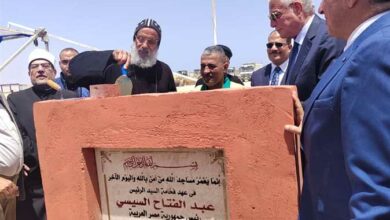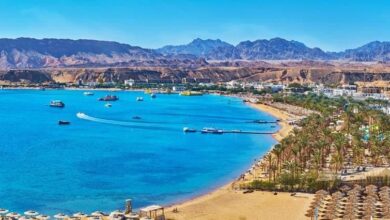Observers voiced mixed feelings over former President Hosni Mubarak’s trial on Wednesday, hailing the incident as historic, but at the same time saying the scope of charges should be widened to include all of the crimes he allegedly perpetrated during three decades in power.
“It is an important movement not only for the Egyptian people, but for all Arabs,” said Bahey Eddin Hassan, director of Cairo Institute for Human Rights Studies. “But this is really a symbolic trial because it is only holding Mubarak accountable for crimes that he perpetrated during [a few] days and does not open the file of 30 years of terrible crimes.”
“We should defend the rights of those victimized [during the revolution], but justice requires that we all defend the rights of all Egyptians who suffered under this regime,” added Hassan.
On Wednesday, Mubarak became the first Egyptian ruler to stand trial in a local court on the heels of a sweeping revolution. The 83-year-old defendant stands accused of plotting to kill at least 846 protesters during the 18-day-uprising against him.
The prosecutor has also charged Mubarak with profiteering by acquiring for himself and his sons five villas worth nearly LE40 million. The formal contracts were provided by fugitive businessman Hussein Salem, who in return allegedly acquired two million square meters of land in the South Sinai resort town of Sharm el-Sheikh. Salem, who was arrested in Spain in June, is also wanted on finanical corruption charges regarding Egypt's gas deal with Israel.
For Ahmed Ragheb, head of the Hisham Mubarak Law Center, the allegations against the former president are not comprehensive enough.
“Mubarak is responsible for torturing [Egyptians] for 30 years, stealing public money and political and economic corruption. He should be tried for all these crimes,” he said.
For more than two hours, Judge Ahmed Refaat, who is presiding over the trials of Mubarak, his sons and other officials, listened to the demands of the defense and prosecution teams. Mubarak’s attorney Farid al-Deeb made seven requests, including summoning Field Marshal Hussein Tantawi, head of Egypt’s ruling Supreme Council of the Armed Forces (SCAF) to testify.
By insinuating that he might drag military leaders into the case, Ragheb believes that Deeb is trying to pressure the SCAF to intervene on behalf of Mubarak.
“He wants to convey a message that other parties might be tried if Mubarak’s trial continues on,” he said.
The SCAF has promised to return to the barracks as soon as parliamentary and presidential elections conclude. Yet in recent months, the body has come under criticism from revolutionary political groups for monopolizing the decision-making process during the transition period.
“I think this is one of Deeb's most well-known ploys, either to prolong the trial or impose conditions that are very difficult to meet,” said Mostafa Kamel al-Sayyed, political science professor at The American University in Cairo.
Deeb was not the only lawyer who demanded that Tantawi testify. Lawyers representing the families of revolution's martyrs asked the court to call Tantawi and Chief of Staff Sami Enan for questioning about whether Mubarak asked them to order the army to crush the revolution.
“Would [Tantawi] accept the request? I do not know, but I doubt it very much,” said Sayyed. “I do not think he would like to be involved in any action that could incriminate the president. He would not like to be put in the position of saying something that could affect the sentence.”
Refaat did not order subpoenas for any military leaders during Wednesday's session.
Wednesday was Mubarak’s first public appearance since 10 February, when he delivered his last televised speech as president. The day's trial was preceded by widespread suspicion that the ailing former president would not show up in court. Skeptics held that the SCAF would not let its former leader stand trial.
Former Interior Minister Habib al-Adly and six of his aides also stood trial during the same court session yesterday, although defense lawyers requested the defendants be tried separately. The judge adjourned their trial until 4 August.
Refaat adjourned Mubarak’s trial until 15 August, ordering that he be kept under medical supervision in a hospital on the Cairo-Ismailia highway.
Mubarak has been held in a Sharm al-Sheikh hospital since the prosecutor ordered his detention in April. Some have argued this constitutes special treatment and he should be transferred to the hospital at Tora prison.
Ragheb says that detaining Mubarak in a Cairo hospital is a middle-ground solution that will please both angry protesters and the SCAF leaders who are still loyal to their former supreme commander.
“The military is still treating Mubarak as a military leader and is trying to fulfill the minimum requirement of preserving his dignity,” he said.




